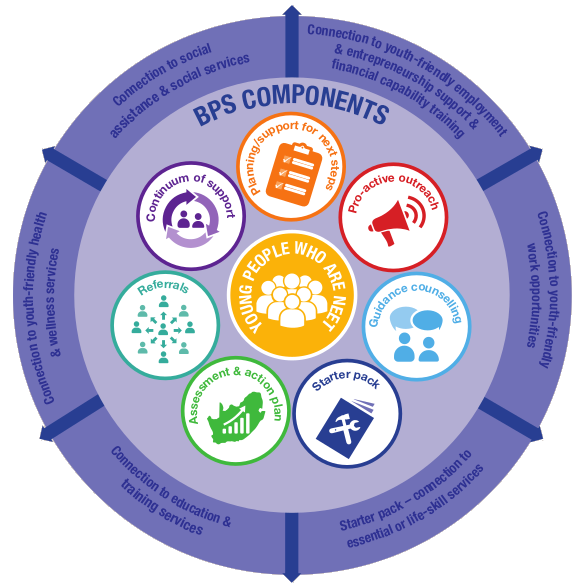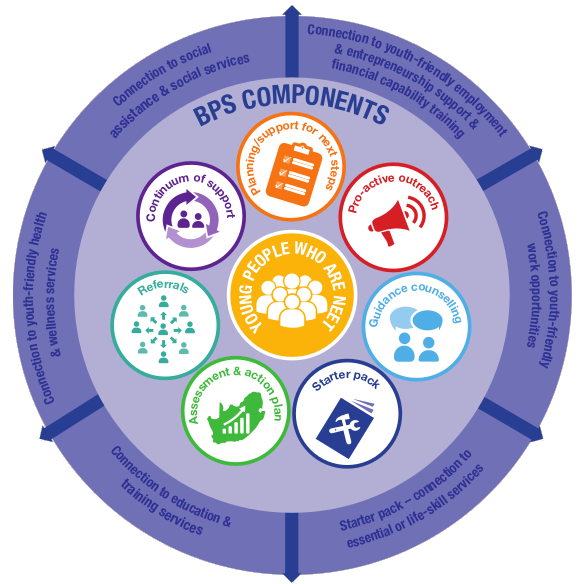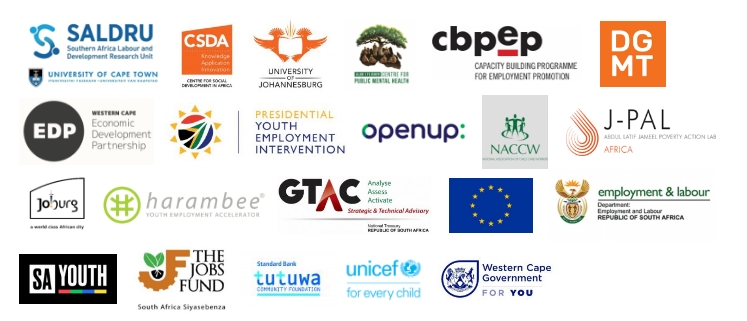This project builds on earlier work, led by UCT’s Poverty & Inequality Initiative and SALDRU in 2017 in partnership with a coalition of partners in government, academia and civil society, to conceptualise a more comprehensive approach to support South Africa’s youth.
Research indicates that the majority of the country’s youth are facing significant challenges across multiple dimensions of deprivation, and that their vulnerabilities are especially stark as they transition through adolescence and into adulthood. During this life stage, large proportions of young people are unable to connect to educational opportunities or the labour market and thus become ‘invisible’ to the administrative systems. At that point, they are ‘NEET’ (not in any kind of employment, education or training), leaving them at risk of longer-term economic and social exclusion.
These young people’s challenges need to be addressed better, more inclusively and responsively.
Phase 1: Designing a Basic Package of Support for young people who are NEET
In 2019, a consortium of academic, governmental and non-governmental partners embarked on
defining and designing a more comprehensive and integrated approach to service delivery for South Africa’s young people who are NEET. Informed by international best practices of comprehensive support to young people, the project carefully considered and consulted on the suitability and feasibility of an intervention appropriate for the South African context. The result was a comprehensive evidence-based proposal for the development and implementation of a Basic Package of Support for youth who are NEET. Read more.
In 2019, a consortium of academic, governmental and non-governmental partners embarked on defining and designing a more comprehensive and integrated approach to service delivery for South Africa’s young people who are NEET. Informed by existing comprehensive models of support, implemented by the European Union and beyond, the project carefully considered and consulted on the suitability and feasibility of a similar intervention adjusted for the South African context. The result was a comprehensive evidence-based proposal for the development and implementation of a BPS for youth who are NEET.
The BPS project has used a consultative approach of involving stakeholders from the start to provide input and guidance on the design of a multi-faceted package of support for young people in South Africa.
The objectives of phase 1 were to:
- define the building blocks of a South African programme of support to young people, and its target group;
- determine the delivery mechanism to the target group, the duration and programme pathways;
- based on a review of existing policies, propose a policy framework for the programme;
- determine the data systems requirements for successfully delivering the programme;
- based on available data, provide estimates on the cost of the implementation of the programme; and
- develop a proposal for a place-specific pilot phase, and a monitoring and evaluation framework.
The proposed BPS programme for South Africa’s young people, which was finalised at the end of 2019, set out a compound activation and guidance intervention model that proactively seeks out young people who are NEET. It emphasised offering face-to-face, tailored and multi-faceted support that meets the various needs of a young person. The BPS was founded on seven principles that, collectively, are meant to provide an activation strategy and a ‘seamless’ experience for NEET youth that means that young people no longer have to figure out pathways to (re)connection on their own. The seven BPS pillars combine peer-to-peer outreach, guidance counselling, referral to services within a community of practice, and are supported by a case management system that ensures a continuum of support.

In a next phase, BPS pilots will be developed to achieve proof of concept.
The work was funded and provided with technical support by the Capacity Building Programme for Employment Promotion, funded by the European Union and based in the Government Technical Advisory Centre in the National Treasury.
Phase 1 of the BPS project was led by SALDRU and conducted in partnership with the:
- Abdul Latif Jameel Poverty Action Lab Africa;
- Centre for Social Development in Africa, University of Johannesburg;
- DG Murray Trust;
- The Jobs Fund.
Phase 2: Towards implementing a Basic Package of Support for young people who are NEET
The BPS model that emerged out of phase 1 requires both a transversal policy approach and a youth-centred programmatic intervention. The project now moves into a much more applied phase, still in broad collaboration with previous – and new – partners, including the National Pathway Management Network of the Presidential Youth Employment Intervention. This phase, which commenced at the beginning of 2020, focuses on developing and nurturing multi-sectoral communities of practice at national, provincial and local levels to support both young people and the services and opportunities that exist for them; and to prepare the necessary systems and tools that will be needed for the next phase of piloting the BPS in four selected communities in two provinces of South Africa.
The BPS model that emerged out of phase 1 implies both a transversal policy approach and a youth-centred programmatic intervention. The summary report and underlying body of work from phase 1 carefully set out the various building blocks of the BPS intervention, founded on a review of international best practices. While the project team proposed a pilot of the BPS in different South African municipalities, they also put forward an overarching, national institutional framework that can both ensure sufficient resource allocation and safeguard the quality, integrity and coherence of the intervention when rolled out at scale.
In 2020, the second phase of the project focuses on preparing for the roll out of a viable, implementable pilot of the BPS. The work continues in collaboration with phase 1 partners – SALDRU, J-PAL Africa; Centre for Social Development in Africa, University of Johannesburg; the DG Murray Trust, The Jobs Fund – and new partners, including the National Pathway Management Network of the Presidential Youth Employment Intervention, Harambee and OpenUp.
Components of the work are funded and provided with technical support by the Capacity Building Programme for Employment Promotion, funded by the European Union and based in the Government Technical Advisory Centre. The DG Murray Trust is funding, and taking the lead on, the development of various crucial tools for the efficient and accurate working of the BPS. UNICEF South Africa, together with the National Youth Development Agency and the Western Cape Government, is funding the first BPS pilot that will be launched in Atlantis in August 2021. The verification and mapping of service delivery information on the Youth Explorer is receiving additional funding via the World Bank and, later in 2021, from the Agence Française de Développement as part of the Research Facility on Inequality funded by the European Union.
The BPS model that will be piloted emphasises offering face-to-face, tailored and multi-faceted support that meets the various needs of a young person. It combines peer-to-peer outreach, guidance counselling, referral to services within a community of practice, and are supported by a case management system that ensures a continuum of support in the long term.

Crucial to the working of the BPS is also the building of local communities of practice (CoPs) to support both young people and the services and opportunities that exist for them. For those local CoPs to be effective, they need to be nested within and supported by a broader CoP that spans across national and provincial levels of governance, involving departments relevant to the well-being of youth (the national institutional framework).
The objectives of this phase of the project are, therefore, to:
- develop and nurture multi-sectoral CoPs at national, provincial and local government levels;
- prepare for pilots of the BPS in four selected communities in two provinces of South Africa.
These objectives will be achieved through the following workstreams and partnerships under SALDRU’s leadership:
- Continued engagement, advocacy and communication about the programme to:
- the broader public, policymakers and prospective funding partners;
- young people and their communities.
- The development and testing of practical project tools, led by the DG Murray Trust in collaboration and consultation with partners, such as for:
- the assessment and referral of young people;
- the action plan development;
- the training curriculum for the guidance workers and mobilisers;
- the starter pack material.
- The exploration, assessment and preparation of pilot sites, which will require additional collaboration with various partners and across the two selected provinces.
- Continued engagement with governmental and non-governmental stakeholders to build the CoPs at various levels of governance and to continue to grow the broader BPS coalition of partners.
- The development of a local-level Community of Practice Protocol and the invitation of and collaboration with CoP partners in each of the chosen pilot locations.
- The development and testing of a service mapping approach and tools through a partnership between SALDRU, OpenUp, and other partners, and with guidance from The Presidency.
- The development and testing of the referral and case management systems, aspects of which are explored in conversation with Harambee and potential other partners.
- Refining and finalising the M&E framework and possible tools, in collaboration with J-PAL Africa and other partners.
By collaborating with other BPS consortium partners as well as the National Pathway Management Team, this phase of the project will support – and be supported by – the current critical moment of focus on youth in the national policy environment, increasing its chances for wider institutional support and continued roll-out following the pilots.
Phase 3: Moving into a new wave of data collection for further research
Basic Package of Support was piloted between the beginning of 2022 and the end of 2023 in several sites in Gauteng, KwaZulu Natal and the Western Cape. Qualitative and quantitative data collected during this pilot phase demonstrate improved outcomes across several domains of well-being among young people taking part in the programme. These include self-reported quality of life, mental health and sense of support. Results also indicate improved ability to handle stress and access to services – indicators of improved navigational capacity. Finally, we see that by the time participants have completed three coaching sessions almost 40% of them have reconnected to some form of learning or earning opportunity.
This research report provides an overview of the findings.
As BPS enters a new stage of further evaluation and consolidation, we have just collected the first wave of data in a new tracer study, implemented with support from the WorldBank.
We have also begun the work to gather several of the longer-term pathway narratives of young people in the programme. A first collection of those is available here.
Basic Package of Support was piloted between the beginning of 2022 and the end of 2023 in several sites in Gauteng, KwaZulu Natal and the Western Cape. Qualitative and quantitative data collected during this pilot phase demonstrate improved outcomes across several domains of well-being among young people taking part in the programme. These include self-reported quality of life, mental health and sense of support. Results also indicate improved ability to handle stress and access to services – indicators of improved navigational capacity. Finally, we see that by the time participants have completed three coaching sessions almost 40% of them have reconnected to some form of learning or earning opportunity.
This research report provides an overview of the findings.
As BPS enters a new stage of further evaluation and consolidation, we have just collected the first wave of data in a new tracer study, implemented with support from the WorldBank.
We have also begun the work to gather several of the longer-term pathway narratives of young people in the programme. A first collection of those is available here.
Research reports
Journal articles
Why Is Youth Unemployment So Intractable in South Africa?
Working papers
Videos
Policy briefs and fact sheets
Piloting the Basic Package of Support – A call for investment 2020/2021
The state of youth well-being in South Africa during the COVID-19 pandemic
Background reports and summary papers
BPS partners:

